| Listing 1 - 10 of 18 | << page >> |
Sort by
|
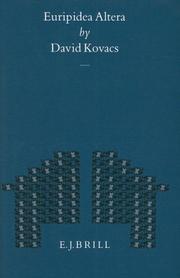
ISBN: 9004106243 9004329870 9789004106246 Year: 1996 Volume: 161 Publisher: Leiden Brill
Abstract | Keywords | Export | Availability | Bookmark
 Loading...
Loading...Choose an application
- Reference Manager
- EndNote
- RefWorks (Direct export to RefWorks)
This volume, which continues the textual discussions section of the author's Euripidea (Brill, 1994), discusses those passages in Euripides' Heraclidae, Hippolytus, Andromache, Hecuba, Supplices, Electra, Heracles , and Troades - the plays of the author's Loeb Euripides, volumes Two and Three - where text or translation was in need of explanation or justification. A large number of new conjectures are proposed and some forgotten conjectures argued for.
Euripides --- Greek drama (Tragedy) --- Mythology, Greek --- Tragédie grecque --- Mythologie grecque --- History and criticism --- Drama --- Histoire et critique --- Théâtre --- Criticism and interpretation. --- Mythology, Greek, in literature. --- Tragedy. --- Mythology, Greek, in literature --- Tragedy --- -Criticism and interpretation --- -Euripides --- Euripide --- Criticism and interpretation --- Tragédie grecque --- Théâtre --- Euripides. --- Ėvripid --- Yūrībīdīs --- Euripedes --- Eŭripido --- Eurypides --- Euripidesu --- אוריפידס --- エウリーピデース --- Εὐριπίδης
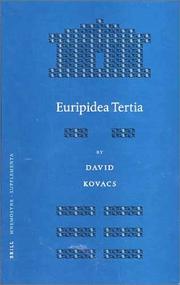
ISBN: 9004129774 9004349995 9789004129771 9789004349995 Year: 2003 Volume: 240 Publisher: Leiden : E.J. Brill,
Abstract | Keywords | Export | Availability | Bookmark
 Loading...
Loading...Choose an application
- Reference Manager
- EndNote
- RefWorks (Direct export to RefWorks)
Euripidea Tertia is a companion volume to the Loeb Classical Library edition of Euripides. It discusses places in the text primarily of the late plays where the editor's choice of variants or adoption of conjectures required some explanation and also places where the translation needed explaining. The plays covered are Iphigenia Taurica, Ion, Helen, Phoenissae, Orestes, Bacchae, Iphigenia Aulidensis , and Rhesus , with addenda on earlier plays. Reviewers of the earlier volumes Euripidea and Euripidea Altera have commented on the cogency and sensitivity of his textual arguments. Serious students of Euripides, tragedy, textual criticism, and Greek metre will all want to read this book.
Greek drama (Tragedy) --- Mythology, Greek --- Tragédie grecque --- Mythologie grecque --- History and criticism --- Drama --- Histoire et critique --- Théâtre --- Euripides --- Criticism and interpretation. --- Mythology, Greek, in literature. --- Tragedy. --- Mythology, Greek, in literature --- Tragedy --- -Criticism and interpretation --- -Euripides --- Euripide --- Criticism and interpretation --- Tragédie grecque --- Théâtre --- Ėvripid --- Yūrībīdīs --- Euripedes --- Eŭripido --- Eurypides --- Euripidesu --- אוריפידס --- エウリーピデース --- Εὐριπίδης
Book
ISBN: 0801835305 Year: 1987 Publisher: Baltimore (Md.) : Johns Hopkins university press,
Abstract | Keywords | Export | Availability | Bookmark
 Loading...
Loading...Choose an application
- Reference Manager
- EndNote
- RefWorks (Direct export to RefWorks)
875 EURIPIDES --- Hecuba (Legendary character) in literature --- Heroes in literature --- Hippolytus (Greek mythology) in literature --- Queens in literature --- Tragedy --- Trojan War --- -Mythology, Greek --- Drama --- Griekse literatuur--EURIPIDES --- Literature and the war --- Euripides --- Troy (Extinct city) --- -In literature --- Hecuba (Legendary character) in literature. --- Heroes in literature. --- Hippolytus (Greek mythology) in literature. --- Queens in literature. --- Tragedy. --- Literature and the war. --- -Griekse literatuur--EURIPIDES --- 875 EURIPIDES Griekse literatuur--EURIPIDES --- Euripide --- -Drama --- Mythology, Greek --- -875 EURIPIDES Griekse literatuur--EURIPIDES --- Euripides. --- In literature.
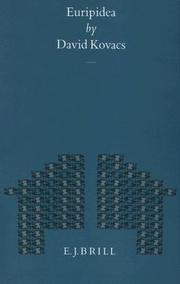
ISBN: 9004099263 9004329374 9789004099265 Year: 1994 Volume: 132 Publisher: Leiden Brill
Abstract | Keywords | Export | Availability | Bookmark
 Loading...
Loading...Choose an application
- Reference Manager
- EndNote
- RefWorks (Direct export to RefWorks)
Euripidea contains material to supplement Volume One of the author's Loeb Euripides. It consists of two parts, Testimonia Vitae et Artis Selecta and Textual Discussions. The Testimonia, ancient notices about the life of Euripides and his career as a tragic poet, are printed together for the first time, together with a facing English translation. The Loeb Introduction examines this material critically. Equipped with this body of evidence, students of Greek tragedy and of ancient biography will be able to assess for themselves the reliability of the biographical tradition, in which, the author argues, too much confidence has been placed by interpreters of the plays. The Textual Discussions explain places in the plays of Volume One, Cyclops, Alcestis and Medea , where the text adopted by the editor calls for comment.
Euripides --- Ecrivains grecs --- Dramatists, Greek --- Mythology, Greek, in literature. --- -Mythology, Greek, in literature --- Greek dramatists --- Euripide --- Mythology, Greek, in literature --- Tragedy --- Drama --- Biography --- Euripides. --- Tragedy. --- Biography. --- Greek drama (Tragedy) --- Authors, Greek --- Tragédie grecque --- History and criticism --- Histoire et critique --- Biographie --- Dramatists, Greek. --- Ėvripid --- Yūrībīdīs --- Euripedes --- Eŭripido --- Eurypides --- Euripidesu --- אוריפידס --- エウリーピデース --- Εὐριπίδης
Book
ISBN: 9780198854838 9780198854845 Year: 2020 Publisher: New York : Oxford University Press,
Abstract | Keywords | Export | Availability | Bookmark
 Loading...
Loading...Choose an application
- Reference Manager
- EndNote
- RefWorks (Direct export to RefWorks)
"Oedipus the King is the best-known play we have from the pen of Sophocles and was recognized as a masterpiece in Aristotle's Poetics, which cites the play more often than any other as an example of how to write tragedy. The principal character is the king of a city ravaged by a mysterious plague, who consults Apollo at Delphi and is told that the plague will end only when those who killed the previous king, Laius, are found and punished. He launches an investigation, in the course of which he learns not only that he is himself the killer, but that Laius was his father and Laius' widow, whom he married, his own mother. As a result of this revelation Oedipus changes from being a respected king and conscientious investigator into a polluted and self-blinded outcast. This volume presents a highly-polished English verse translation of Sophocles' powerful play which renders both the beauty of his language and the horror of the events being dramatized. A detailed introduction and notes clearly elucidate how the plot is constructed and the meaning this construction implies, as well as how Sophocles ably concealed the fact that his characters act in ways which differ from what we expect in real life. It also addresses influential misinterpretations, thereby offering an accessible and authoritative introduction to the play that will be of benefit to a wide range of readers"--
Greek drama (Tragedy) --- Oedipus, --- Greece --- Thebes (Greece)
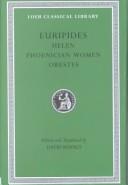
ISBN: 0674996003 9780674996007 Year: 2002 Volume: 5 11 Publisher: Cambridge : Harvard University Press,
Abstract | Keywords | Export | Availability | Bookmark
 Loading...
Loading...Choose an application
- Reference Manager
- EndNote
- RefWorks (Direct export to RefWorks)
Euripides (c. 485-406 BCE) has been prized in every age for his emotional and intellectual drama. Eighteen of his ninety or so plays survive complete, including Medea, Hippolytus, and Bacchae, one of the great masterpieces of the tragic genre. Fragments of his lost plays also survive.
Helen of Troy (Greek mythology) --- Seven against Thebes (Greek mythology) --- Orestes (Greek mythology) --- Seven against Thebes --- Thebes, Seven against (Greek mythology) --- Mythology, Greek --- Euripides --- Greek drama (Satyr play) --- Greek drama (Tragedy) --- Greek drama --- Mythology, Greek, in literature --- Tragedy --- Greek mythology --- Satyric drama, Greek --- Ėvripid --- Yūrībīdīs --- Euripide --- Euripedes --- Eŭripido --- Eurypides --- Euripidesu --- אוריפידס --- エウリーピデース --- Εὐριπίδης --- Helen, --- Orestes, --- Orest, --- Orestas, --- Oreste, --- Oresti, --- Oresto, --- Oresztész, --- オレステース, --- אורסטס --- 오레스테스, --- اورستس --- Орест, --- Ὀρέστης, --- Elena, --- Helena, --- Helenē, --- Yelena, --- 海伦 , --- ヘレネー, --- הלנה, --- העלענע, --- 헬레네, --- Хелена, --- Єлена, --- Елена , --- هلن, --- هيلين, --- Ἑλένη, --- Drama --- Greek literature --- Dionysia --- Helen of Troy (Greek mythology) - Drama --- Seven against Thebes (Greek mythology) - Drama --- Orestes (Greek mythology) - Drama

ISBN: 0674995333 9780674995338 Year: 1995 Volume: 484 2 Publisher: Cambridge (Mass.): Harvard university press
Abstract | Keywords | Export | Availability | Bookmark
 Loading...
Loading...Choose an application
- Reference Manager
- EndNote
- RefWorks (Direct export to RefWorks)
Euripides (c. 485-406 BCE) has been prized in every age for his emotional and intellectual drama. Eighteen of his ninety or so plays survive complete, including Medea, Hippolytus, and Bacchae, one of the great masterpieces of the tragic genre. Fragments of his lost plays also survive.
Hippolytus (Greek mythology) --- Andromache (Legendary character) --- Hecuba (Legendary character) --- Mythology, Greek --- Drama. --- -Andromache (Legendary character) --- Greek mythology --- Drama --- Euripides --- -Translations into English --- Translations into English. --- Greek drama (Tragedy) --- Greek drama (Satyr play) --- Greek drama --- Mythology, Greek, in literature --- Tragedy --- Andromache --- Hecuba, --- Heracles --- Hippolytus --- Satyric drama, Greek --- Hipòlit --- Hipolitas --- Hipólito --- Hippolütosz --- Hippolyte --- Hippolytos --- Ippolito --- Ippolitu --- 威耳比俄斯 --- Іпполіт --- Хиполит --- Ипполит --- ヒッポリュトス --- هيبوليتوس --- Ἱππόλυτος --- Alcaeus --- Alcides --- Alkaios --- Alkeidēs --- Earcail --- Eracle --- Eracles --- Heracle --- Herakl --- Heraklej --- Hēraklēs --- Héraklész --- Heraklis --- Herakliu --- Heraklo --- Hērakls --- Héthacl'ye --- 赫拉克勒斯 --- ヘーラクレース --- הרקולס --- 헤라클레스 --- Херакле --- Херакъл --- Гэракл --- Геракл --- هرکول --- هيراكليس --- Ἀλκείδης --- Ἀλκαῖος --- Ἡρακλῆς --- Ecuba, --- Hecabe, --- Hécube, --- Hekaba, --- Hekabē, --- Hekabo, --- Hekuba, --- 赫库芭, --- ヘカベー, --- הקובה, --- 헤카베, --- Гекаба, --- Гекуба, --- Хекаба, --- Хекуба, --- هکابه, --- هيكوبا, --- Ἑκάβη, --- Ėvripid --- Yūrībīdīs --- Euripide --- Euripedes --- Eŭripido --- Eurypides --- Euripidesu --- אוריפידס --- エウリーピデース --- Εὐριπίδης --- Andromache, --- Andrómaca --- Andromacha --- Andromaha --- Andromahi --- Andromaka --- Andromakhe --- Andrómakka --- Andromaque --- 安德洛玛刻 --- アンドロマケー --- 안드로마케 --- Андромаха --- Андрамаха --- آندروماخه --- أندروماكا --- Ἀνδρομάχη --- Greek literature --- Dionysia --- Hercules --- Euripides - Translations into English. --- Hippolytus (Greek mythology) - Drama. --- Andromache (Legendary character) - Drama. --- Hecuba (Legendary character) - Drama. --- Mythology, Greek - Drama. --- Tragedies. - gsafd --- Hippolytus (Greek mythology) - Drama
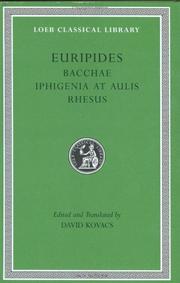
ISBN: 0674996011 9780674996014 Year: 2002 Volume: 495 Publisher: Cambridge (Mass.): Harvard university press
Abstract | Keywords | Export | Availability | Bookmark
 Loading...
Loading...Choose an application
- Reference Manager
- EndNote
- RefWorks (Direct export to RefWorks)
Euripides (c. 485-406 BCE) has been prized in every age for his emotional and intellectual drama. Eighteen of his ninety or so plays survive complete, including Medea, Hippolytus, and Bacchae, one of the great masterpieces of the tragic genre. Fragments of his lost plays also survive.
Rhesus (Legendary character) --- Iphigenia (Greek mythology) --- Pentheus (Greek mythology) --- Dionysus (Greek deity) --- Trojan War --- Bacchantes --- Euripides --- Rhesus, --- Dionysus --- Mythology, Greek --- Maenads --- Cults --- Dionysia --- Greek drama (Satyr play) --- Greek drama (Tragedy) --- Greek drama --- Mythology, Greek, in literature --- Tragedy --- Iphigenia --- Pentheus, --- Greek mythology --- Satyric drama, Greek --- Resas, --- Reso, --- Resos, --- Rhēsos, --- Ῥῆσος, --- Рес, --- Рез, --- Резос, --- Рэс, --- 레소스, --- レーソス, --- Penthée, --- Πενθεύς, --- Τενθεύς, --- Tentheus, --- Ifigeneia --- Ifigenia --- Ifigenija --- Ifigjenia --- Ifixenia --- Iphigeneia --- Iphigenie --- 伊菲革涅亚 --- イーピゲネイア --- איפיגניה --- 이피게네이아 --- Іфігенія --- Ифигенија --- Ифигения --- إيفيجينيا --- Ἰφιγένεια --- Ėvripid --- Yūrībīdīs --- Euripide --- Euripedes --- Eŭripido --- Eurypides --- Euripidesu --- אוריפידס --- エウリーピデース --- Εὐριπίδης --- Bacchus --- Bakchos --- Dionís --- Dionisas --- Dioniso --- Dionīss --- Dionisu --- Dioniz --- Dionizi --- Dionizo --- Dionizos --- Dionüszosz --- Dionysos --- Dionýzos --- Diyonizosse --- Διόνυσος --- Дионис --- ديونيسوس --- 디오니소스 --- דיוניסוס --- ディオニューソス --- 狄俄倪索斯 --- Βάκχος --- Діоніс --- Drama --- Greek literature --- Drama. --- Rhesus (Legendary character) - Drama. --- Iphigenia (Greek mythology) - Drama --- Pentheus (Greek mythology) - Drama. --- Dionysus (Greek deity) - Drama. --- Trojan War - Drama. --- Bacchantes - Drama. --- Bacchantes - Drama --- Euripides - Translations into English --- Rhesus, - King of Thrace (Legendary character) - Drama --- Dionysus - (Greek deity) - Drama --- Rhesus, - King of Thrace (Legendary character) --- Dionysus - (Greek deity)
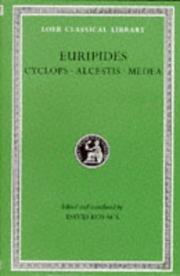
ISBN: 0674995600 9780674995604 Year: 1994 Volume: 9-12, 484, 495, 504, 506 Publisher: Cambridge (Mass.): Harvard university press
Abstract | Keywords | Export | Availability | Bookmark
 Loading...
Loading...Choose an application
- Reference Manager
- EndNote
- RefWorks (Direct export to RefWorks)
Euripides (c. 485-406 BCE) has been prized in every age for his emotional and intellectual drama. Eighteen of his ninety or so plays survive complete, including Medea, Hippolytus, and Bacchae, one of the great masterpieces of the tragic genre. Fragments of his lost plays also survive.
Alcestis (Greek mythology) --- Cyclopes (Greek mythology) --- Medea (Greek mythology) --- Drama. --- Euripides --- Translations into English. --- Greek drama (Tragedy) --- Greek drama (Satyr play) --- Greek drama --- Mythology, Greek --- Mythology, Greek, in literature --- Tragedy --- Alcestis, --- Medea, --- Greek mythology --- Satyric drama, Greek --- Cyclops (Greek mythology) --- Μήδεια, --- Mēdeia, --- Ėvripid --- Yūrībīdīs --- Euripide --- Euripedes --- Eŭripido --- Eurypides --- Euripidesu --- אוריפידס --- エウリーピデース --- Εὐριπίδης --- Alceste, --- Alcestes, --- Alcesti , --- Alkestidė, --- Alcestis --- Alkēstis, --- Alkesto, --- Alkésztisz, --- 阿尔克斯提斯, --- Алкеста, --- Алкестида, --- アルケースティス, --- 알케스티스, --- Ἄλκηστις, --- Drama --- Greek literature --- Dionysia --- Giants --- Mythology --- Translations into English --- Alceste (Mythologie grecque) --- Cyclopes (Mythologie grecque) --- Tragédie grecque --- Médée (Mythologie grecque) --- Théâtre --- Traductions anglaises --- Alcestis (Greek mythology) - Drama --- Cyclopes (Greek mythology) - Drama --- Euripides - Translations into English --- Giants (Folklore)
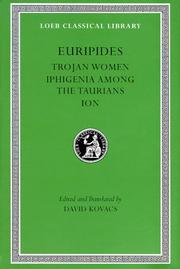
ISBN: 0674995740 9780674995741 Year: 1999 Volume: 4 10 Publisher: Cambridge (Mass.): Harvard university press
Abstract | Keywords | Export | Availability | Bookmark
 Loading...
Loading...Choose an application
- Reference Manager
- EndNote
- RefWorks (Direct export to RefWorks)
Euripides (c. 485-406 BCE) has been prized in every age for his emotional and intellectual drama. Eighteen of his ninety or so plays survive complete, including Medea, Hippolytus, and Bacchae, one of the great masterpieces of the tragic genre. Fragments of his lost plays also survive.
Greek drama (Tragedy) --- Trojan War --- Languages & Literatures --- Greek & Latin Languages & Literatures --- Translations into English --- -Hecuba (Legendary character) --- -Ion (Greek mythology) --- -Iphigenia (Greek mythology) --- -Trojan War --- -Translations into English --- Drama --- Euripides --- -Mythology, Greek --- -Euripides --- Euripide --- Hecuba (Legendary character) --- Ion (Greek mythology) --- Iphigenia (Greek mythology) --- Translations into English. --- Drama. --- Bacchantes --- Cassandra (Legendary character) --- Helen of Troy (Greek mythology) --- Queens --- Royalty --- Rulers --- Sovereigns --- Maenads --- Hecuba, --- Ion --- Iphigenia --- Ifigeneia --- Ifigenia --- Ifigenija --- Ifigjenia --- Ifixenia --- Iphigeneia --- Iphigenie --- 伊菲革涅亚 --- イーピゲネイア --- איפיגניה --- 이피게네이아 --- Іфігенія --- Ифигенија --- Ифигения --- إيفيجينيا --- Ἰφιγένεια --- Ió --- Iōnas --- Ione --- Jonas --- 伊昂 --- 이온 --- Јон --- Іон --- Йон --- إيون --- Ἴων --- Ἰωνας --- Ecuba, --- Hecabe, --- Hécube, --- Hekaba, --- Hekabē, --- Hekabo, --- Hekuba, --- 赫库芭, --- ヘカベー, --- הקובה, --- 헤카베, --- Гекаба, --- Гекуба, --- Хекаба, --- Хекуба, --- هکابه, --- هيكوبا, --- Ἑκάβη, --- Ėvripid --- Yūrībīdīs --- Euripedes --- Eŭripido --- Eurypides --- Euripidesu --- אוריפידס --- エウリーピデース --- Εὐριπίδης --- Turkey --- Ilion (Extinct city) --- Ilium (Extinct city) --- Middle East --- Troia (Extinct city) --- Troja (Extinct city) --- Trovaharabesi (Extinct city) --- Troy --- Monarchy --- Women --- Courts and courtiers --- Empresses --- Kings and rulers --- Mythology, Greek --- Cults --- Dionysia --- Greek drama (Tragedy) - Translations into English. --- Hecuba (Legendary character) - Drama --- Iphigenia (Greek mythology) - Drama. --- Ion (Greek mythology) - Drama. --- Trojan War - Drama --- Hecuba, Queen of Troy
| Listing 1 - 10 of 18 | << page >> |
Sort by
|

 Search
Search Feedback
Feedback About UniCat
About UniCat  Help
Help News
News